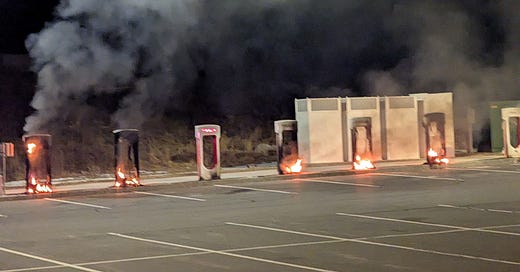Protest have increasingly become a tool not merely for expressing dissent but for exerting coercive pressure upon individuals who diverge from prevailing ideological orthodoxies. Recent organized attacks on Tesla dealerships across the nation provide a troubling illustration of this trend, with explicit efforts aimed at intimidating Tesla’s CEO Elon Musk into abandoning his leadership of the Department of Government Efficiency (DOGE).
Central to this disturbing phenomenon are five Democrat-affiliated non-governmental organizations (NGOs)—Troublemakers, Disruption Project, Rise & Resist, Indivisible Project, and the Democratic Socialists of America (DSA). Funded significantly through ActBlue, these entities have leveraged protest not merely as an act of political expression but as strategic sabotage aimed squarely at Tesla’s economic interests and Musk’s personal resolve.
The coordinated nature of these demonstrations warrants serious attention. Troublemakers and Disruption Project have overtly embraced tactics of direct confrontation, aligning themselves with the more militant strands of leftist activism. Tesla dealerships from coast to coast have experienced not only picketing and verbal harassment of potential customers but also outright vandalism—incidents of shattered showroom windows, vehicles defaced with accusatory graffiti, arson, and even episodes involving gunfire into dealership windows at night.
In New York City, Rise & Resist, known historically for its decentralized activism, has escalated actions into events punctuated by chaotic disruptions. Leveraging their lack of centralized accountability, they’ve orchestrated high-profile disturbances designed specifically for maximum media coverage, thus amplifying the perception of widespread grassroots opposition. The psychological effect on Tesla employees and customers has been palpable—intended, no doubt, to erode confidence and sales, ultimately impacting Musk’s capacity to govern DOGE effectively.
Likewise, the Indivisible Project, established explicitly to challenge conservative administrations post-2016, and the Democratic Socialists of America, openly advocate a redistributionist economic agenda. Both organizations deploy highly organized protest tactics, drawing upon robust funding sources connected directly through ActBlue, whose principal funders include progressive billionaires like George Soros, Reid Hoffman, and Leah Hunt-Hendrix. It is no mere coincidence that these NGOs are deploying tactics that echo historical methods of political intimidation, recalling darker chapters in American history where business interests and personal liberties were undermined by mob coercion.
Elon Musk's recent public revelation via social media that these ActBlue-supported groups were behind the coordinated assaults underscores a deeper, concerning element. ActBlue itself currently faces intense scrutiny over allegations involving illegal and foreign donations—a critical legal and ethical concern. The recent resignation of seven senior ActBlue officials, including the associate general counsel, further punctuates the gravity of these allegations.
The legal implications are profound. Commentators have rightly suggested Musk could invoke federal statutes specifically aimed at protecting civil rights from conspiratorial deprivation, citing potential violations of 18 U.S.C. §§ 241 and 242. The suggestion of possible terrorism charges reflects the severity of property damage and personal threats involved.
These coordinated efforts transcend mere protest and delve disturbingly into targeted economic sabotage. If the aim of these actions was merely symbolic protest, why then the explicit targeting of Tesla dealerships and the overt threats directed toward employees? Clearly, the intent goes beyond conventional activism—it constitutes an explicit attempt at coercive manipulation designed to force Musk into policy submission through economic intimidation.
Historically, the United States has vigorously protected private enterprise against intimidation and sabotage disguised as political protest. From the Whiskey Rebellion to the labor strikes of the early 20th century, federal responses have repeatedly underscored the necessity of delineating protest from violent intimidation. It remains essential today, in the face of concerted efforts from politically motivated entities, to clearly distinguish legitimate protest from organized campaigns of harassment and economic disruption.
The chilling effect of these actions extends beyond Tesla or Musk alone. It sends a troubling signal that economic and ideological conformity can be enforced through coordinated aggression, masked as grassroots activism. To capitulate to such pressure would set a dangerous precedent, emboldening similar tactics against other private businesses and public figures who diverge from progressive orthodoxy.
Ultimately, the responsibility lies with law enforcement and government agencies to decisively intervene against these orchestrated acts of sabotage. Elon Musk’s call for transparency and accountability, inviting information publicly via his platform, represents not only a defensive posture but also a clarion call for principled resistance against politically motivated economic coercion.
The integrity of public discourse and private enterprise hinges on our collective refusal to yield to intimidation masquerading as protest. The continued unchecked escalation by ActBlue-funded groups requires a robust legal and political response. Failure to act decisively would only encourage further erosion of democratic principles under the guise of political activism. Thus, it is not only Musk’s rights at stake but the very foundations of free enterprise and individual liberty upon which American prosperity and innovation rely.
If you don't already please follow @amuse on 𝕏.






Doesn't this qualify as terrorism?